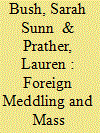| Srl | Item |
| 1 |
ID:
172834


|
|
|
|
|
| Summary/Abstract |
What explains variation in individual preferences for foreign economic engagement? Although a large and growing literature addresses that question, little research examines how partner countries affect public opinion on policies such as trade, foreign aid, and investment. We construct a new theory arguing that political side-taking by outside powers shapes individuals’ support for engaging economically with those countries. We test the theory using original surveys in the United States and Tunisia. In both cases, the potential partner country's side-taking in the partisan politics of the respondents’ country dramatically shapes support for foreign economic relations. As the rise of new aid donors, investors, and trade partners creates new choices in economic partners, our theory and findings are critical to understanding mass preferences about open economic engagement.
|
|
|
|
|
|
|
|
|
|
|
|
|
|
|
|
| 2 |
ID:
171842


|
|
|
|
|
| Summary/Abstract |
Although globalization and international migration have increased personal connections across national borders, we know little about how these connections affect attitudes toward foreign policy. This study examines how transnational ties affect support for foreign aid in donor countries. It argues that transnational ties increase support for foreign aid via two mechanisms: group interests and cosmopolitanism. An original survey experiment embedded in a national survey of one thousand Latino Americans shows that Latinos vary significantly in the strength of their transnational ties, which is strongly correlated with support for foreign aid. The findings from the experiment, which varies the location of an American foreign aid program, demonstrate that, although group interests explain some of this effect, cosmopolitanism is also an important mechanism. Indeed, Latinos with transnational ties equally support aid to Africa and Latin America. A test of the generalizability of the findings to other racial and ethnic groups in the United States and United Kingdom reveal that group interests may be a more powerful mechanism outside of the Latino American community. This study encourages further work on the relationship between transnational ties and foreign policy attitudes and provides insight into the emerging link between international migration and foreign aid.
|
|
|
|
|
|
|
|
|
|
|
|
|
|
|
|
| 3 |
ID:
160513


|
|
|
|
|
| Summary/Abstract |
Prior research has sought to understand the rise of election observers and their consequences for outcomes such as fraud, protest, and violence. These studies are important but they overlook a significant individual-level dynamic that observers themselves care about: the effect that election observers have on local attitudes about elections. We argue that the activities of election observers can enhance elections' local credibility, but only when locals perceive observers as being both capable of detecting fraud and unbiased in that pursuit. Not all observer groups are seen as equally capable and unbiased. Evidence from a large-scale, nationally representative experiment in Tunisia supports the argument. A key finding is that observers from the Arab League—an organization criticized internationally for low-quality election observation—enhanced credibility the most because they were perceived locally as both relatively capable and unbiased.
|
|
|
|
|
|
|
|
|
|
|
|
|
|
|
|